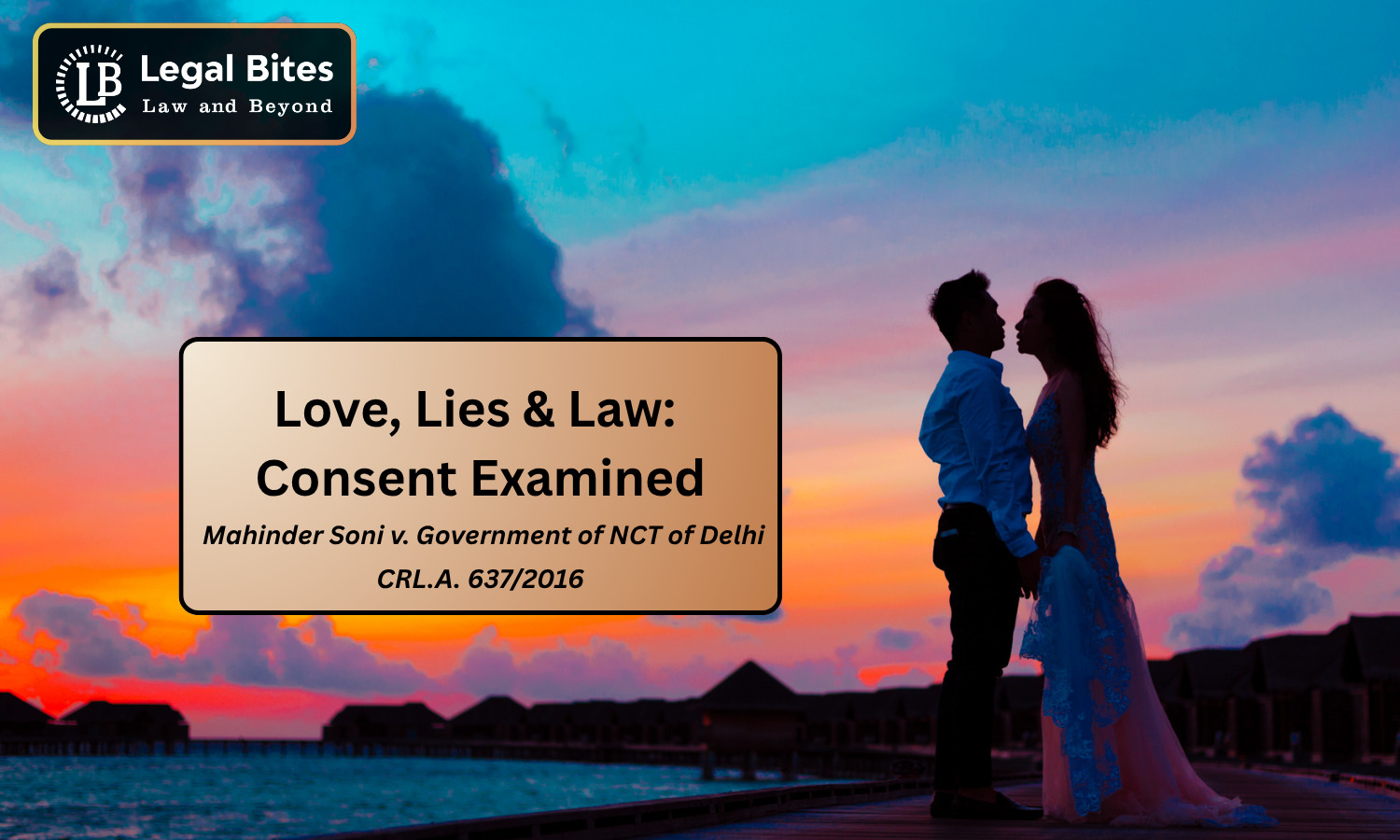
The intersection of consent, sexual autonomy, and broken promises of marriage poses a complex challenge for both courts and legal scholars. In India, where intimate relationships often straddle the border between personal emotional commitment and formal legal obligations, determining whether such consent remains valid when marriage fails to follow becomes especially fraught with legal and moral implications.
A recent judgment of the Delhi High Court in Mahinder Soni v. Government of NCT of Delhi (2025) delivers a crucial judicial reflection on this issue.
Facts of the Case
The appellant, Mahinder Soni, was convicted under Section 376 of the IPC (Section 64 BNS) for rape, based on allegations made by the prosecutrix (whose identity is withheld), who claimed that the appellant had repeatedly subjected her to sexual intercourse under the false pretext of marriage.
- The prosecutrix’s father had died in 2001, and she lived with her mother.
- The appellant, a tenant at their home since November 2011, developed a close association with her.
- On February 9, 2012, the appellant allegedly took her to a guest house and had non-consensual intercourse.
- Subsequently, they had sexual relations multiple times, purportedly based on promises of marriage.
- When the appellant allegedly refused to marry her later, she lodged an FIR on June 4, 2012.
The Trial Court convicted the appellant and sentenced him to seven years’ rigorous imprisonment and a fine of ₹10,000.
Promise to Marry: False from the Beginning or Breach Later?
The Supreme Court in Pramod Suryabhan Pawar v. State of Maharashtra (2019) held that to constitute rape, the promise of marriage must have been false from the outset. Mere breach of a promise—owing to unforeseen circumstances—is insufficient.
Similar judicial clarification came in Deepak Gulati v. State of Haryana (2013), where the Court reasoned that:
“There is a distinction between the mere breach of a promise and not fulfilling a false promise… An accused can be convicted for rape only if it is proven that the intention was mala fide and he had clandestine motives.”
This principle was reiterated recently by the Supreme Court in Prashant v. State of NCT of Delhi (2025), distinguishing between consensual relationships and those tainted by deception.
Delhi High Court in Mahinder Soni applied these principles to evaluate whether the sexual relationship rested on valid consent.
Court’s Reasoning
In this case, the appellant was convicted by the trial court under Section 376 IPC (Section 64 BNS) for allegedly establishing physical relations with the prosecutrix on the pretext of marriage. The Sessions Court had accepted the prosecution’s version that the appellant’s refusal to marry after repeated relations amounted to rape.
However, upon appeal, the Delhi High Court set aside the conviction on the ground that the prosecutrix appeared to be a consenting adult in a relationship involving voluntary physical intimacy extending over months — a relationship that only soured when marriage did not follow.
The Court’s observations are instructive:
“A sexual relationship maintained over a period of time between two adults ordinarily raises a presumption of valid and conscious consent… the parties maintained a close and voluntary association for several months during which sexual intercourse took place multiple times, until their relationship eventually broke down in May 2012.”
The Court further noted the lack of corroboration of force or deception:
- No medical or forensic evidence supported allegations of non-consensual intercourse.
- The complainant herself continued a relationship with the accused even after the first alleged sexual encounter.
- Delay of nearly four months in filing the FIR remained unexplained.
Critically, the Court applied the test from Pramod Suryabhan Pawar to conclude that the promise of marriage did not appear false at inception and that the relationship broke down due to financial concerns raised by the appellant:
“The appellant replied that he had no money at that time to meet marriage expenses.”
Finally, the Court observed that the prosecutrix’s improvements during testimony and inconsistencies suggested doubt about the credibility of the allegations.
The High Court acquitted the accused of rape, reiterating that the law must guard against using criminal charges to penalise failed relationships.
Conclusion
Consent given in a romantic relationship is usually presumed valid unless evidence shows it was obtained through deception. A failed promise of marriage alone does not always prove deception. The courts must assess the totality of circumstances — timing, conduct, testimonial consistency, and supporting evidence — before concluding if such consent was invalid under Section 90 IPC (Section 314 BNS).
The judgment in Mahinder Soni v. NCT of Delhi (2025) reinforces a careful, nuanced approach: relationships broken by mistrust or external circumstances are not rape. But relationships built on deception and false assurances remain punishable under rape laws.
Important Link
Law Library: Notes and Study Material for LLB, LLM, Judiciary, and Entrance Exams